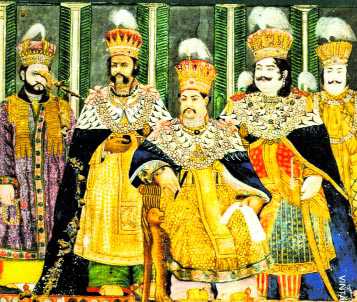Lucknow rediscovered: A new Nawab emerges
Legendary poet Meer Taqi Meer (1723-1810) says: Lucknow Dilli Se bhi Behtar Hai (Lucknow is better than Delhi). Want proof? Read on. Leaf through 'The Last King in India: Wajid Ali Shah' by Rosie Llewellyn-Jones. Chances are you would cease to believe that the Nawab of Awadh (anglicized 'Oudh') was an outright debauch. He loved luxury, royalty, his manhood, but more significantly, he was a lover of arts; his was perhaps the first reign (1847-56)) that sheltered theatre.
First, about Rosie Llewellyn-Jones, the writer. She was a British student of Hindi and Urdu from SOAS, University of London, and came to Lucknow in the 70s. Urdu textbook 'Guzista Lucknow' by Maulana Sharar made her besotted with the much-derided architecture of the city by the British. Even after having written 10 books on various facets of the city, there seems no end to this love affair. Now in her 70s, she keeps coming back to discover more.
'The Last King in India: Wajid Ali Shah' dispels many myths built around the city once known for its cultural richness. The British propaganda machine ridiculed everything associated with the popular Nawabs whom they found lazy and misfit to govern 'Oudh.' Their worst acidic scoff was reserved for Wajid Ali Shah, appreciated by people for his romantic poetry, theatre and dance. The cultural misgivings caused much bad blood between the dreamer Nawab, and the Company sahebs. Awadh was annexed in 1856 and its Nawab was jailed in Calcutta. Wajid Ali Shah wrote two books, as did his father, but these were never made public. Thus history received only one side of the truth.
'The Last King in India…' reveals the last Nawab's love for Hindu gods. The young king not only organised outlandish Krishna-Radha musicals, he annually organised Jogi mela, in which the king and his attendants, including a few women would be smeared with ash (bhabhut) like the yogis and the king would pretend to hide in a mountain (a prop). Everyone else was told to appear in saffron clothes.
"In 1843 when he staged a play on the life of Krishna, this was an important moment in the history of Indian theatre. For the first time a Muslim monarch was directing a play about a Hindu god. He had a habshi paltan and had a special fascination for dark women. Begum Hazrat Mahal, who gave a tough time to the British, was of African descent."
Rosie narrates an anecdote, when Wajid Ali Shah was a young boy. One day during lessons he kept tapping his feet to an invisible orchestra which so annoyed his tutor that he slapped the prince so hard that it led to permanent loss of hearing in one ear.
The correlation between so-called debased architecture and decadent ruler was repeated frequently by the British. Qaisarbagh, Lucknow's last palace complex, had the misfortune of being chosen as the headquarters of the mutineers in 1857-58. It was partially demolished in an act of vandalism. Several boxes of photographs were burnt and other fixtures looted. This led to lack of research on the history and architecture of Lucknow. For the only and first ever exhibition held on Lucknow in Los Angeles and Paris, not a single object came from Lucknow, which reflects the extent of vandalism post-mutiny.
vandanashukla10@gmail.com









